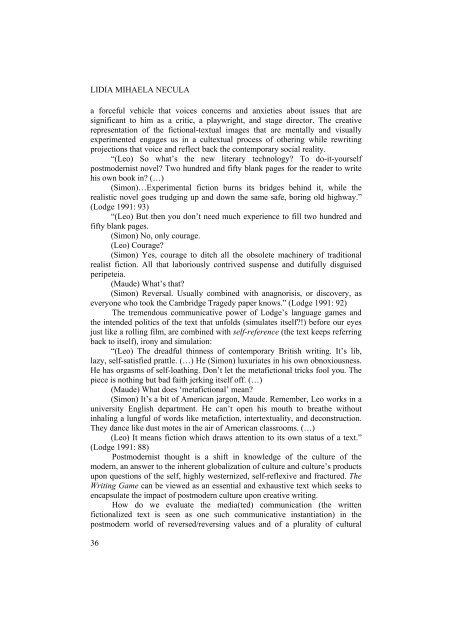culture, subculture and counterculture - Facultatea de Litere
culture, subculture and counterculture - Facultatea de Litere
culture, subculture and counterculture - Facultatea de Litere
Create successful ePaper yourself
Turn your PDF publications into a flip-book with our unique Google optimized e-Paper software.
LIDIA MIHAELA NECULA<br />
a forceful vehicle that voices concerns <strong>and</strong> anxieties about issues that are<br />
significant to him as a critic, a playwright, <strong>and</strong> stage director. The creative<br />
representation of the fictional-textual images that are mentally <strong>and</strong> visually<br />
experimented engages us in a cultextual process of othering while rewriting<br />
projections that voice <strong>and</strong> reflect back the contemporary social reality.<br />
“(Leo) So what’s the new literary technology? To do-it-yourself<br />
postmo<strong>de</strong>rnist novel? Two hundred <strong>and</strong> fifty blank pages for the rea<strong>de</strong>r to write<br />
his own book in? (…)<br />
(Simon)…Experimental fiction burns its bridges behind it, while the<br />
realistic novel goes trudging up <strong>and</strong> down the same safe, boring old highway.”<br />
(Lodge 1991: 93)<br />
“(Leo) But then you don’t need much experience to fill two hundred <strong>and</strong><br />
fifty blank pages.<br />
(Simon) No, only courage.<br />
(Leo) Courage?<br />
(Simon) Yes, courage to ditch all the obsolete machinery of traditional<br />
realist fiction. All that laboriously contrived suspense <strong>and</strong> dutifully disguised<br />
peripeteia.<br />
(Mau<strong>de</strong>) What’s that?<br />
(Simon) Reversal. Usually combined with anagnorisis, or discovery, as<br />
everyone who took the Cambridge Tragedy paper knows.” (Lodge 1991: 92)<br />
The tremendous communicative power of Lodge’s language games <strong>and</strong><br />
the inten<strong>de</strong>d politics of the text that unfolds (simulates itself?!) before our eyes<br />
just like a rolling film, are combined with self-reference (the text keeps referring<br />
back to itself), irony <strong>and</strong> simulation:<br />
“(Leo) The dreadful thinness of contemporary British writing. It’s lib,<br />
lazy, self-satisfied prattle. (…) He (Simon) luxuriates in his own obnoxiousness.<br />
He has orgasms of self-loathing. Don’t let the metafictional tricks fool you. The<br />
piece is nothing but bad faith jerking itself off. (…)<br />
(Mau<strong>de</strong>) What does ‘metafictional’ mean?<br />
(Simon) It’s a bit of American jargon, Mau<strong>de</strong>. Remember, Leo works in a<br />
university English <strong>de</strong>partment. He can’t open his mouth to breathe without<br />
inhaling a lungful of words like metafiction, intertextuality, <strong>and</strong> <strong>de</strong>construction.<br />
They dance like dust motes in the air of American classrooms. (…)<br />
(Leo) It means fiction which draws attention to its own status of a text.”<br />
(Lodge 1991: 88)<br />
Postmo<strong>de</strong>rnist thought is a shift in knowledge of the <strong>culture</strong> of the<br />
mo<strong>de</strong>rn, an answer to the inherent globalization of <strong>culture</strong> <strong>and</strong> <strong>culture</strong>’s products<br />
upon questions of the self, highly westernized, self-reflexive <strong>and</strong> fractured. The<br />
Writing Game can be viewed as an essential <strong>and</strong> exhaustive text which seeks to<br />
encapsulate the impact of postmo<strong>de</strong>rn <strong>culture</strong> upon creative writing.<br />
How do we evaluate the media(ted) communication (the written<br />
fictionalized text is seen as one such communicative instantiation) in the<br />
postmo<strong>de</strong>rn world of reversed/reversing values <strong>and</strong> of a plurality of cultural<br />
36












